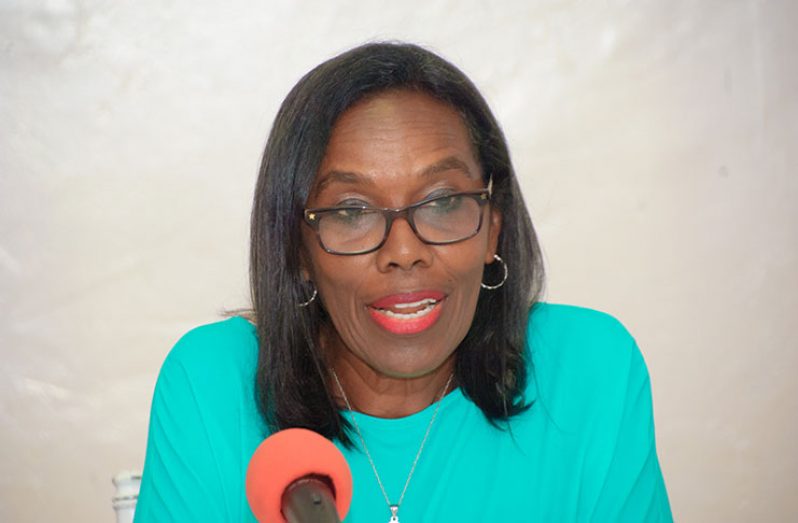WRACKED by civil strife,Venezuela’s Ambassador to Guyana, Reina Diaz has issued a call on both the Guyana Government and the people of Guyana to support her country’s president, Nicholas Maduro in his call for dialogue with the opposition, so as to end that country’s ongoing unrests.
The call by Guyana’s Spanish-speaking neighbour comes at a time when the United Nations has restarted the Good Offices Process between the two countries to bring to finality the Guyana-Venezuela border controversy. At a news conference held at the Venezuelan Embassy, the Ambassador made it clear that the Venezuelan president is doing all he can to have a democratic resolution to the months of riots and violence occurring in the Spanish-speaking country.
She believes that support from the government of Guyana, other regional governments and international bodies will aid in the reduction of what she described as acts of terrorism from radical opposition supporters. “We are grateful for the support of the governments of this region and governments of the world to respect that no ill will is shown by the State. We are grateful for a show of support for dialogue which the government has asked as a means of solving internal problems,” said Ambassador Diaz, who spoke through a translator.
The Venezuelan envoy has noted CARICOM’s statement on the country’s ongoing struggles and also pointed to support received through CELAC and other regional bodies.
“President Maduro has been clear in his call for dialogue…on the national level, he is finding ways to get out of the situation, in peace and democracy,” Ambassador Diaz noted. Venezuela is due for an election in January 2019 and according to the Venezuelan Diplomat, Maduro has done the right thing by calling for the National Constituent Assembly which reinforces that the original constituent power rests with the people of Venezuela.
CARICOM Foreign Ministers last week at the twentieth meeting of the Council for Foreign and Community Relations (COFCOR) noted that the solution to the present situation in Venezuela had to be sought internally and supported by a mediated process. “They were of the view that the deeply entrenched positions needed to be softened so that trust could be built on both sides in order to facilitate dialogue so that the people of Venezuela could peacefully overcome their crisis,” a statement from the CARICOM Secretariat said.
Meanwhile, Article 347 of the Constitution of Venezuela states that the power which belongs to the people “may be exercised by calling a National Constituent Assembly for the purpose of transforming the State, creating a new juridical order and drawing up a new Constitution.”
Article 348 says that a National Constituent Assembly may emanate from the President sitting with the Cabinet of Ministers from the National Assembly, by a two-thirds vote of its members; from the Municipal Councils in open session, by a two-thirds vote of their members; and from 15 per cent of the voters registered with the civil and electoral registry.
Additionally, Article 349 of the said Constitution states that the President of Venezuela shall not have the power to object to the new constitution. “The existing constituted authorities shall not be permitted to obstruct the Constituent Assembly in any way,” the Constitution states.
Ambassador Diaz made it clear that President Maduro is steadfast in his call for there to be “dialogue in peace.” The opposition has not heeded the call made by the Venezuelan President on May 1; there are 18 political organisations affiliated with the opposition parties, the envoy disclosed. According to the Ambassador, in 2014 and 2016, it was the same political opposition which called for the National Constitution Assembly.
President Maduro she said has proposed to involve the masses, which includes the most vulnerable of the country’s population: farmers, students, persons with disabilities, indigenous peoples,to name a few.
Meanwhile, Ambassador Diaz said her country is also concerned about international reportage of the unrests in Venezuela. She said reports by the foreign media are not focused on the efforts being made by Maduro to end the unrests. In fact, she said more emphasis is placed on what she described as the “so called peaceful protests.”
Moreover, she noted that the opposition is working in tandem with those who claim to “be owners of the world” in a bid to overthrow the Bolivarian Revolution Government. She noted that those guilty of acts of terrorism are the same people who in 2002 attempted to overthrow the government and believes that the advancements and achievements of the current government ought to be taken into consideration. “These supposed peaceful demonstrators have the clear objective to overthrow the legitimate president of Venezuela and reverse the social achievement of the Venezuelan people,” she said while adding that there is an international media campaign “which falsifies the reality…present images that travel the world.”
It is her belief that the efforts of the opposition are to show “national commotion” so as to allow foreign intervention. “The Opposition funded by foreign aid and with media support have created matrix of hatred, persecution and aggression towards government officials and to all those who sympathize with the Bolivarian thinking,” the envoy added while stating that the opposition and the media are attempting “to make people believe that there are violent protest all over the country when in fact most of the manifestation have mainly occurred in three states (out of 24).”
Several international bodies have called on Venezuela to call elections soon to put to rest the ongoing violence and protests in the South American country which have left several dead and others badly injured.



.jpg)








